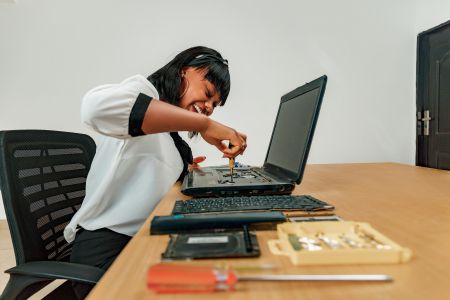Why Does My Laptop Become Slow After 2 Years of Use?
It's a frustrating experience: you've purchased a laptop that initially felt fast and responsive, but over time, it begins to slow down. This is a common issue, and there are several reasons why it may occur. In this article, we'll explore some of the key causes and provide tips to improve your laptop's performance.
- User Becoming More Efficient
One of the most surprising reasons your laptop may feel slower over time actually has nothing to do with the device's technical specifications. As you gain more experience with your laptop and optimize your workflows, it may seem like the laptop is slowing down, when in reality, it's just a matter of higher expectations. As you get used to multitasking or using heavy-duty programs, the same laptop that once felt fast may now seem slower in comparison to your improved efficiency.
- Inadequate Ventilation and Maintenance
Another common reason for the deterioration of a laptop's performance is a lack of adequate ventilation and maintenance. Laptops are designed to dissipate heat through ventilation openings and fans. If these openings become clogged with dust, dirt, or simply due to prolonged use, heat dissipation can be hindered. This can lead to thermal throttling, where the processor and graphics card are scaled back to prevent overheating, resulting in decreased performance.
Regular maintenance of your laptop, such as cleaning the ventilation openings and fans, can help prevent this issue and improve performance.
- Aging Hardware and Increasing Software Requirements
Another significant factor contributing to a laptop's slowdown is the aging of hardware combined with the increasing demands of software. While your laptop may have been adequately powerful when you purchased it, new programs and operating systems are often optimized for newer hardware. This means that over time, the same tasks may require more resources, making your laptop feel slower than before.
- Full Hard Drive and Operating System Overload
Lastly, a full hard drive and an overloaded operating system can significantly impair your laptop's performance. When the hard drive becomes full, the operating system may struggle to quickly find the necessary data, resulting in delayed load times and overall performance issues. Additionally, an overloaded operating system can lead to conflicts and system errors that can affect the overall stability of your laptop.
Tips for Improving Your Laptop's Performance
- Perform regular maintenance, such as cleaning ventilation openings and fans, to optimize heat dissipation.
- Consider upgrading hardware, such as adding more RAM or switching to a solid-state drive (SSD), to enhance overall performance.
- Remove unnecessary files and programs to free up space on your hard drive and relieve strain on the operating system.
- Keep your operating system and installed programs up-to-date to take advantage of performance improvements and security updates.
By following these tips and being aware of the possible reasons for your laptop's slowdown, you can maximize the lifespan and performance of your device.













